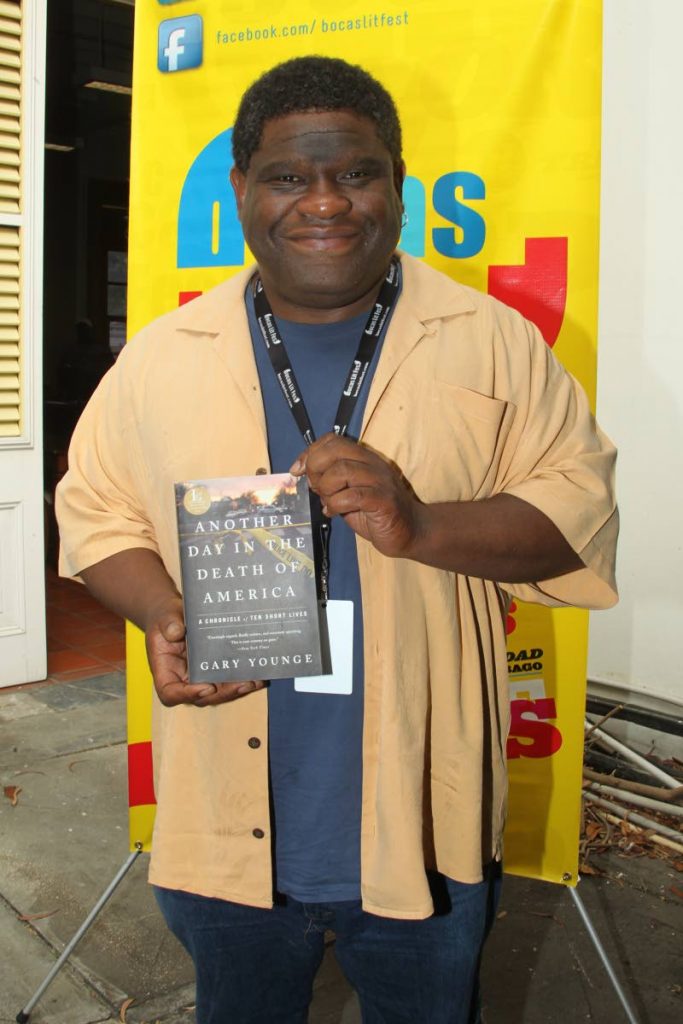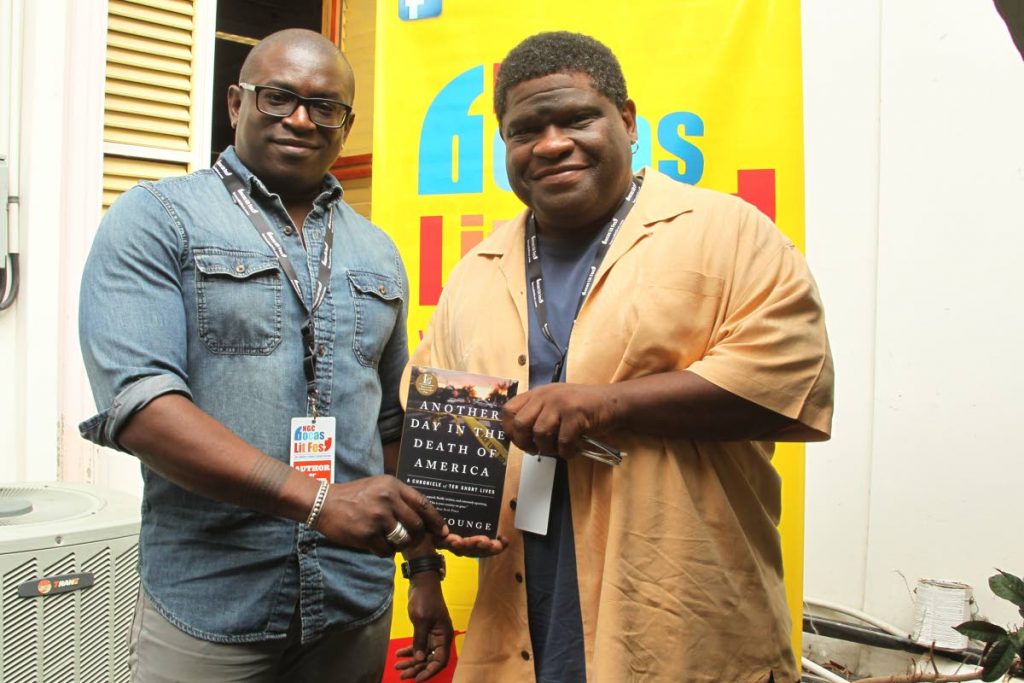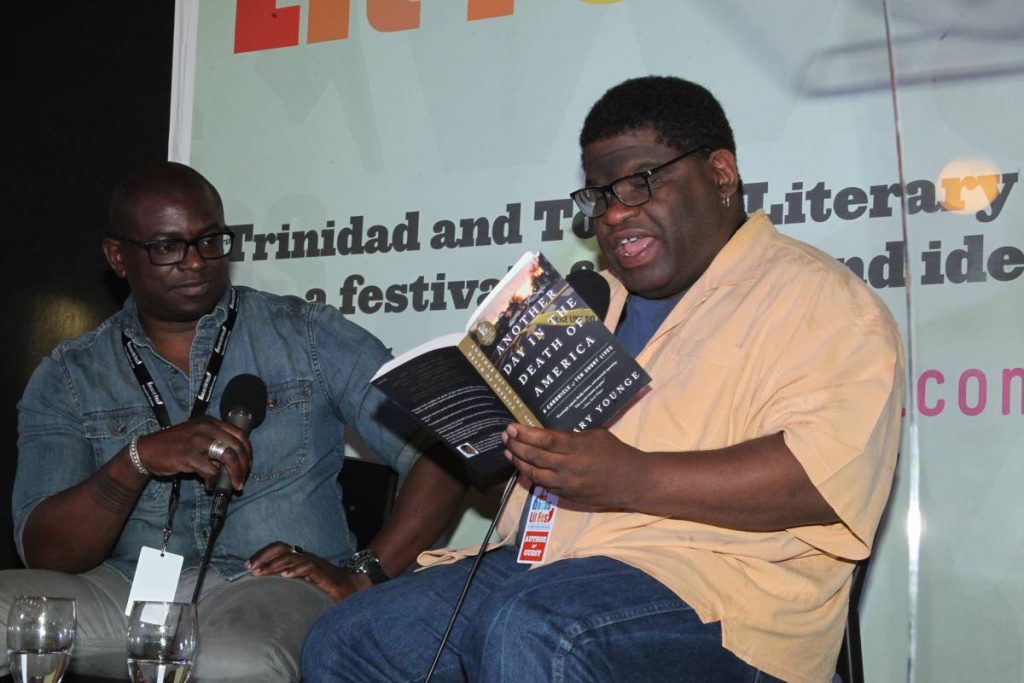An unlikely champion

Gary Younge is affable and unassuming. In fact, to quote his own portrait of himself, “I cut an unlikely figure in most professional circumstances. Small (five feet six), tubby, black, dishevelled…” What’s more, he offers this self-deprecating description in one of his own books, explaining why an American woman he was asking for information replied that she didn’t understand a word he’d said.
But don’t let this apparent confession of bumbling ineptitude fool you.
Younge was an unobtrusive, thoughtful presence in Port of Spain for this year’s Bocas LitFest: he chaired the non-fiction prize judges, spoke about his own most recent book and was part of a tribute to the Jamaican-British novelist Andrea Levy, who died in February. The two had been friends for 20 years, and Younge spoke of her with eloquence, admiration and candour, summing up Levy’s relationship to him as that of a “slightly mean big sister.”
Younge, 50, is an editor at large with the UK Guardian, after being its US correspondent for many years. He also writes for the US magazine The Nation, and has made radio and television documentaries.
He has a shelf of awards to his name, among them the 2018 (Broadsheet) Feature Writer of the Year from the Society of Editors, and the Amnesty Feature of the Year Award. In 2015 he was The Comment Awards’ Foreign Commentator of the Year and received the David Nyhan Prize for political journalism from Harvard’s Shorenstein Center. In 2009, he won Britain’s prestigious James Cameron Award for “combined moral vision and professional integrity.” He was the Best Newspaper Journalist in Britain’s Ethnic Minority Media Awards from 2001-2003.
Then there are his books, five of them to date.
Every journalist should read the most recent, Another Day in the Death of America: A Chronicle of Ten Short Lives (2016).
“It’s the powerless on whose behalf he writes,” said the Shorenstein Center’s director. Novelist Martin Amis described this book as “a tour de force of regulated passion.”

Another Day in the Death of America is a painful read, but you can’t put it down, mesmerised by the stories it tells and the inexorable conclusions Younge reaches in a scorching condemnation of a society that allows young people access to guns, but not to decent jobs or education or a fair criminal justice system. His passion is sometimes regulated with difficulty: in his afterword he says writing the book made him want to scream, in sorrow and frustration. “You can’t legislate for common sense and decency,” he writes, though his own shine from every page.
The book has a simple premise. Younge chose a random date in 2013, then tracked down every child and teenager who died by the gun that day in the US, telling the stories of their short lives and needless deaths. Most were black. Some died by chance, by being in the wrong place at the wrong time, or through mistaken identity. All died for stupid, trivial reasons. When Younge talked to their parents over a year later, some were bitter, some still stumbling through a daze of grief.
Journalists are warned against “editorialising” – inserting their opinions into news reports. But Younge’s conclusions are grounded in the bedrock of fact. He did his research, drawing on studies of gun culture and poverty, gangs and racism.
But it’s the fundamentals of journalism that make the reader care about these adolescent strangers from Indiana and North Carolina, Texas and California. Younge’s book is an impeccable example of Reporting 101: he went to the places where they lived and died, their homes and schools and churches, talked to parents and siblings, friends and funeral home staff.
In an interview during Bocas he said he found this return to reporting “nourishing” – the detective work of physically tracking down these young people (the youngest was nine), combing social media accounts for clues to what they were like and where to look for their families, reading tweets they posted 20 minutes before they were shot, going through autopsy reports, persuading people to talk to him about their dead children. He told himself, “Nobody’s going to tell these stories unless I get them to tell me.” That “mitigated the things that were hard,” he says in a huge understatement. How much it affected him is hinted at in the book’s dedication to the ten boys and young men, “for who you were and who you might have been.” There are pages that you read through tears.
And yet some of these heartbreaking stories were barely reported in the places where they happened. Deaths like these – an 11-year-old killed because he and his friend were left alone in a house full of guns; a teenager casually murdered because he hung out with gang members – have become “ordinary.” Younge understands this phenomenon. “I write this with neither pride nor guilt,” he comments. “There is a level of detachment inherent, and arguably necessary, in the profession. Without it, one would become emotionally depleted.” And the resources that a newsroom can devote to such a story are scarce. He considers too the limitations of empathy, and the gaps between US journalists and the people they write about.
It’s not surprising that as the father of two black children born in America, Younge moved his family to Britain in 2015. “If you’re looking for a place to escape racism, don’t go to England,” he says. “But in the US the racism is more lethal.”
Born in southern England to Barbadian parents, Younge went to Barbados once, at 18, but it wasn’t home. “There’s no place where people will say, ‘Gary, you’re back!’” So home is wherever he finds kindred spirits; he’s discovered members of his “tribe” everywhere.
He and his two older brothers were brought up by their mother, who was first a nurse and then a teacher. The household was highly political, and Gary a very left-wing teenager. An “overachiever” at school, he took a gap year “to grow up” before going to university; he spent it working in a refugee camp in Sudan.

He got involved in student politics at university in Edinburgh, as well as studying French and, as befitted a former Trotkyist, Russian. But his original career plan fell apart when “it became clear that I did not love interpreting.”
He’d been invited to contribute to the journalistic coverage of a student rent strike, but wasn’t interested at first. Luckily, he changed his mind, though he found it very hard. But the woman running the course saw something in him, and helped him rework his piece. It was published in the Scotsman newspaper and earned him “20 quid or something.”
By now he liked journalism enough to apply for a Guardian bursary for ethnic minority students to study it at City University in London. After that he freelanced, did research and translated foreign stories for the paper, until his big break in 1994: he was sent to South Africa, four years after Nelson Mandela’s release from prison, to cover the country’s first post-apartheid election.
Better still, Younge couldn’t drive. So he’d hitch rides with other journalists – and one day he found himself in the car carrying Mandela’s bodyguards.
“They found me amusing. They let me ride around with them and I became a weird ancillary part of Mandela’s entourage.” Eventually he got to meet Mandela. His first big story, The Black Knight, came out of that experience and earned him a real job at the Guardian.
Younge reported for the foreign desk, then won a fellowship at the Washington Post, where in 1996 he met the woman he later married. Wanting to spend more time with her, and hence to stay in the US, led to his first book, No Place like Home. After a spell in England they returned to the US in 2003, living in New York and then Chicago, his wife’s hometown.
Younge can choose what he wants to write about now. That’s often race or politics, but he advises black journalists to write about whatever they’re passionate about.
He’s not working on a book at present, but no doubt there will be more. “Journalism is an important thing,” he believes. “It can feel like snacking. But you build up a body of knowledge” – and it’s that body of knowledge that has led to his books.
As for reading, crucial for any writer, he reads stories he sees on social media, as well as his own paper, of course, The Economist and the left-wing UK magazine the New Statesman.
He also usually has “two books on the go, one fiction and one non-fiction.” Books he’d recommend to aspiring journalists include The Soccer War and the wonderful The Emperor (on Haile Selassie) and Shah of Shahs, all by Polish journalist Ryszard Kapuscinski; and Ten Men Dead, by one of his own mentors, David Beresford, on the 1981 Irish republican hunger strikers. Describing these books as “brilliantly written and insightful,” he points out that they entail “that very basic and vital journalistic trait: listening to people.”
These are qualities, of course, shared by Another Day in the Death of America.
The epigraph of the book is from Sven Lindqvist, the Swedish academic who has written about imperialism and racism. “It is not knowledge we lack,” Younge quotes. “What is missing,” Lindqvist goes on, “is the courage to understand what we know and to draw conclusions.”
In Another Day in the Death of America, as in his columns, Younge fills gaps in that knowledge and draws persuasive conclusions with not only courage but compassion.

Comments
"An unlikely champion"